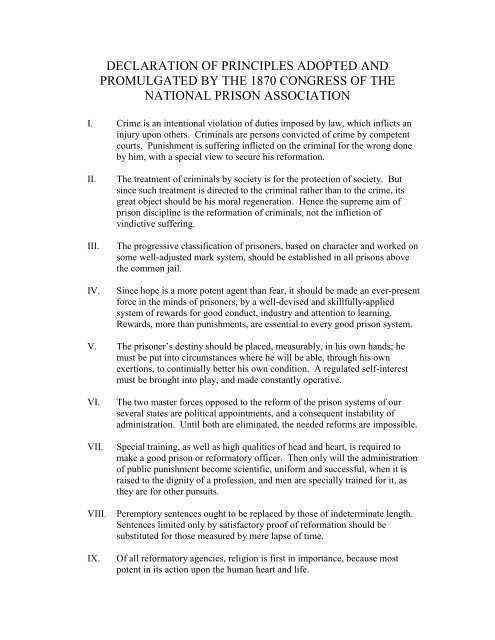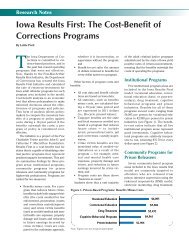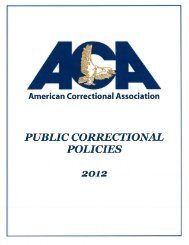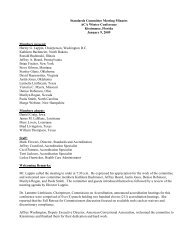Declaration Of Principles Adopted And Promulgated By The
Declaration Of Principles Adopted And Promulgated By The
Declaration Of Principles Adopted And Promulgated By The
Create successful ePaper yourself
Turn your PDF publications into a flip-book with our unique Google optimized e-Paper software.
DECLARATION OF PRINCIPLES ADOPTED AND<br />
PROMULGATED BY THE 1870 CONGRESS OF THE<br />
NATIONAL PRISON ASSOCIATION<br />
I. Crime is an intentional violation of duties imposed by law, which inflicts an<br />
injury upon others. Criminals are persons convicted of crime by competent<br />
courts. Punishment is suffering inflicted on the criminal for the wrong done<br />
by him, with a special view to secure his reformation.<br />
II. <strong>The</strong> treatment of criminals by society is for the protection of society. But<br />
since such treatment is directed to the criminal rather than to the crime, its<br />
great object should be his moral regeneration. Hence the supreme aim of<br />
prison discipline is the reformation of criminals, not the infliction of<br />
vindictive suffering.<br />
III. <strong>The</strong> progressive classification of prisoners, based on character and worked on<br />
some well-adjusted mark system, should be established in all prisons above<br />
the common jail.<br />
IV. Since hope is a more potent agent than fear, it should be made an ever-present<br />
force in the minds of prisoners, by a well-devised and skillfully-applied<br />
system of rewards for good conduct, industry and attention to learning.<br />
Rewards, more than punishments, are essential to every good prison system.<br />
V. <strong>The</strong> prisoner’s destiny should be placed, measurably, in his own hands; he<br />
must be put into circumstances where he will be able, through his own<br />
exertions, to continually better his own condition. A regulated self-interest<br />
must be brought into play, and made constantly operative.<br />
VI. <strong>The</strong> two master forces opposed to the reform of the prison systems of our<br />
several states are political appointments, and a consequent instability of<br />
administration. Until both are eliminated, the needed reforms are impossible.<br />
VII. Special training, as well as high qualities of head and heart, is required to<br />
make a good prison or reformatory officer. <strong>The</strong>n only will the administration<br />
of public punishment become scientific, uniform and successful, when it is<br />
raised to the dignity of a profession, and men are specially trained for it, as<br />
they are for other pursuits.<br />
VIII. Peremptory sentences ought to be replaced by those of indeterminate length.<br />
Sentences limited only by satisfactory proof of reformation should be<br />
substituted for those measured by mere lapse of time.<br />
IX. <strong>Of</strong> all reformatory agencies, religion is first in importance, because most<br />
potent in its action upon the human heart and life.
X. Education is a vital force in the reformation of fallen men and women. Its<br />
tendency is to quicken the intellect, inspire self-respect, excite to higher aims,<br />
and afford a healthful substitute for low and vicious amusements. Education<br />
is, therefore, a matter of primary importance in prisons, and should be carried<br />
to the utmost extent consistent with the other purposes of such institutions.<br />
XI. In order to [sic] the reformation of imprisoned criminals, there must be not<br />
only a sincere desire and intention to that end, but a serious conviction, in the<br />
minds of the prison officers, that they are capable of being reformed, since no<br />
man can heartily maintain a discipline at war with his inward beliefs; no man<br />
can earnestly strive to accomplish what in his heart he despairs of<br />
accomplishing.<br />
XII. A system of prison discipline, to be truly reformatory, must gain the will of<br />
the convict. He is to be amended; but how is this possible with his mind in a<br />
state of hostility? No system can hope to succeed, which does not secure this<br />
harmony of wills, so that the prisoner shall choose for himself what his officer<br />
chooses for him. But, to this end, the officer must really choose the good of<br />
the prisoner, and the prisoner must remain in his choice long enough for virtue<br />
to become a habit. This consent of wills is an essential condition of<br />
reformation.<br />
XIII. <strong>The</strong> interest of society and the interest of the convicted criminal are really<br />
identical, and they should be made practically so. At present there is a combat<br />
between crime and laws. Each sets the other at defiance, and, as a rule, there<br />
is little kindly feeling, and few friendly acts, on either side. It would be<br />
otherwise if criminals, on conviction, instead of being cast off, were rather<br />
made the objects of a generous parental care; that is, if they were trained to<br />
virtue, and not merely sentenced to suffering.<br />
XIV. <strong>The</strong> prisoner’s self-respect should be cultivated to the utmost, and every effort<br />
made to give back to him his manhood. <strong>The</strong>re is no greater mistake in the<br />
whole compass of penal discipline, than its studied imposition of degradation<br />
as a part of punishment. Such imposition destroys every better impulse and<br />
aspiration. It crushes the weak, irritates the strong, and indisposes all to<br />
submission and reform. It is trampling where we ought to raise, and is<br />
therefore as unchristian in principle as it is unwise in policy.<br />
XV. In prison administration, moral forces should be relied upon, with as littler<br />
admixture of physical force as possible, and organized persuasion be made to<br />
take the place of coercive restraint, the object being to make upright and<br />
industrious free men, rather than orderly and obedient prisoners. Brute force<br />
may make good prisoners; moral training alone will make good citizens. To<br />
the latter of these ends, the living soul must be won; to the former, only the<br />
inert and obedient body.
XVI. Industrial training should have both a higher development and a greater<br />
breadth than has heretofore been, or is now, commonly given to it in our<br />
prisons. Work is no less an auxiliary to virtue, than it is a means of support.<br />
Steady, active, honorable labor is the basis of all reformatory discipline. It not<br />
only aids reformation, but is essential to it. It was a maxim with Howard,<br />
“make men diligent, and they will be honest” – a maxim which his congress<br />
regards as eminently sound and practical.<br />
XVII. While industrial labor in prisons is of the highest importance and utility to the<br />
convict, and by o means injurious to the laborer outside, we regard the<br />
contract system of prison labor, as now commonly practiced in our country, as<br />
prejudicial alike to discipline, finance and the reformation of the prisoner, and<br />
sometimes injurious to the interest of the free laborer.<br />
XVIII. <strong>The</strong> most valuable parts of the Irish prison system – the more strictly penal<br />
stage of separate imprisonment, the reformatory stage of progressive<br />
classification, and the probationary stage of natural training – are believed to<br />
be as applicable to one country as another – to the United states as to Ireland.<br />
XIX. Prisons, as well as prisoners, should be classified or graded so that there shall<br />
be prisons for the untried, for the incorrigible and for other degrees of<br />
depraved character, as well as separate establishments for women, and for<br />
criminals of the younger class.<br />
XX. It is the judgment of this congress, that repeated short sentences for minor<br />
criminals are worse than useless; that, in fact, they rather stimulate than<br />
repress transgression. Reformation is a work of time; and a benevolent regard<br />
to the good of the criminal himself, as well as to the protection of society,<br />
requires that his sentence be long enough for reformatory processes to take<br />
effect.<br />
XXI. Preventive institutions, such as truant homes, industrial schools, etc., for the<br />
reception and treatment of children not yet criminal, but in danger of<br />
becoming so, constitute the true field of promise, in which to labor for the<br />
repression of crime.<br />
XXII. More systematic and comprehensive methods should be adopted to save<br />
discharged prisoners, by providing them with work and encouraging them to<br />
redeem their character and regain their lost position in society. <strong>The</strong> state has<br />
not discharged its whole duty to the criminal when it has punished him, nor<br />
even when it has reformed him. Having raised him up, it has the further duty<br />
to aid in holding him up. <strong>And</strong> to this end it is desirable that state societies be<br />
formed, which shall co-operate with each other in this work.
XXIII. <strong>The</strong> successful prosecution of crime requires the combined action of capital<br />
and labor, just as other crafts do. <strong>The</strong>re are two well defined classes engaged<br />
in criminal operations, who may be called the capitalists and the operatives. It<br />
is worthy of inquiry, whether a more effective warfare may not be carried on<br />
against crime, by striking at the capitalists as a class, than at the operatives<br />
one by one. Certainly, this double warfare should be vigorously pushed, since<br />
from it the best results, as regards repressive justice, may be reasonably hoped<br />
for.<br />
XXIV. Since personal liberty is the rightful inheritance of every human being, it is the<br />
sentiment of this congress that the state which has deprived an innocent<br />
citizen of this right, and subjected him to penal restraint, should, on<br />
unquestionable proof of its mistake, make reasonable indemnification for such<br />
wrongful imprisonment.<br />
XXV. Criminal lunacy is a question of vital interest to society; and facts show that<br />
our laws regarding insanity, in its relation to crime, need revision, in order to<br />
bring them to a more complete conformity to the demands of reason, justice<br />
and humanity; so that, when insanity is pleaded in bar of conviction, the<br />
investigation may be conducted with greater knowledge, dignity and fairness;<br />
criminal responsibility be more satisfactorily determined; the punishment of<br />
the same criminal be made more sure, and the restraint of the insane be<br />
rendered at once more certain and more humane.<br />
XXVI. While this congress would not shield the convicted criminal from the just<br />
responsibility of his misdeeds, it arraigns society itself as in no slight degree<br />
accountable for the invasion of its rights and the warfare upon its interests,<br />
practiced by the criminal classes. Does society take all the steps which it<br />
easily might, to change, or at least to improve, the circumstances in our social<br />
state that lead to crime; or, when crime has been committed, to cure the<br />
proclivity to it, generated by these circumstances? It cannot be pretended.<br />
Let society, then, lay the case earnestly to its conscience, and strive to mend in<br />
both particulars. <strong>Of</strong>fences, we are told by a high authority, must come; but a<br />
special woe is denounced against those through whom they come. Let us take<br />
heed that that woe fall not upon our head.<br />
XXVII. <strong>The</strong> exercise of executive clemency in the pardon of criminals is a practical<br />
question of grave importance, and of great delicacy and difficulty. It is<br />
believed that the annual average of executive pardons from the prisons of the<br />
whole county reaches ten per cent of their population. <strong>The</strong> effect of the too<br />
free use of the pardoning power is to detract from the certainty of punishment<br />
for crimes, and to divert the mind of prisoners from the means supplied for<br />
their improvement. Pardons should issue for one or more of the following<br />
reasons, viz.: to release the innocent, to correct mistakes made in imposing the<br />
sentence, to relieve such suffering from ill-health as requires release from<br />
imprisonment, and to facilitate or reward the real reformation of the prisoner.
<strong>The</strong> exercise of this power should be by the executive, and should be guarded<br />
by careful examination as to the character of the prisoner and his conduct in<br />
prison. Furthermore, it is the opinion of this congress that governors of state<br />
should give to their respective legislatures the reasons, in each case, for their<br />
exercise of the pardoning power.<br />
XXVIII. <strong>The</strong> proper duration of imprisonment for a violation of the laws of society is<br />
one of the most perplexing questions in criminal jurisprudence. <strong>The</strong> present<br />
extraordinary inequality of sentences for the same or similar crimes is a source<br />
of constant irritation among prisoners, and the discipline of our prisons suffers<br />
in consequence. <strong>The</strong> evil is one for which some remedy should be devised.<br />
XXIX. Prison statistics, gathered from a wide field and skillfully digested, are<br />
essential to an exhibition of the true character and working of our prison<br />
systems. <strong>The</strong> collection, collation and reduction to tabulated forms of such<br />
statistics can best be effected through a national prison discipline society, with<br />
competent working committees in every state, or by the establishment of a<br />
national prison bureau, similar to the recently instituted national bureau of<br />
education.<br />
XXX. Prison architecture is a matter of grave importance. Prisons of every class<br />
should be substantial structures, affording gratification by their design and<br />
material to a pure taste, but not costly or highly ornate. We are of the opinion<br />
that those of moderate size are best, as regards both industrial and reformatory<br />
ends.<br />
XXXI. <strong>The</strong> construction, organization, and management of all prisons should be by<br />
the state, and they should form a graduated series of reformatory<br />
establishments, being arranged with a view to the industrial employment,<br />
intellectual education and moral training of the inmates.<br />
XXXII. As a general rule, the maintenance of penal institutions, above the county<br />
jail, should be from the earnings of their inmates, and without cost to the state;<br />
nevertheless, the true standard of merit in their management is the rapidity and<br />
thoroughness of reformatory effect accomplished thereby.<br />
XXXIII. A right application of the principles of sanitary science in the construction<br />
and arrangements of prisons is a point of vital importance. <strong>The</strong> apparatus for<br />
heating and ventilation should be the best that is known; sunlight, air and<br />
water should be afforded according to the abundance with which nature has<br />
provided them; the rations and clothing should be plain but wholesome,<br />
comfortable, and in sufficient but not extravagant quantity; the bedsteads, bed<br />
and bedding, including sheets and pillow cases, not costly but decent, and kept<br />
clean, well aired and free from vermin; the hospital accommodations, medical<br />
stores and surgical instruments should be all that humanity requires and
science can supply; and all needed means for personal cleanliness should be<br />
without stint.<br />
XXXIV. <strong>The</strong> principle of the responsibility of parents for the full or partial support of<br />
their criminal children in reformatory institutions has been extensively applied<br />
in Europe, and its practical working has been attended with the best results. It<br />
is worthy of inquiry whether this principle may not be advantageously<br />
introduced into the management of our American reformatory institutions.<br />
XXXV. It is our conviction that one of the most effective agencies in the repression<br />
of crime would be the enactment of laws by which the education of all the<br />
children of the state should be made obligatory. Better to force education<br />
upon the people than to force them into prison to suffer for crimes, of which<br />
the neglect of education and consequent ignorance have been the occasion, if<br />
not the cause.<br />
XXXVI. As a principle that crowns all, and is essential to all, it is our conviction that<br />
no prison system can be perfect, or even successful to the most desirable<br />
degree, without some central authority to sit at the helm, guiding, controlling,<br />
unifying and vitalizing the whole. We ardently hope yet to see all the<br />
departments of our preventive, reformatory and penal institutions in each state<br />
moulded into one harmonious and effective system; its parts mutually<br />
answering to and supporting each other; and the whole animated by the same<br />
spirit, aiming at the same objects and subject to the same control; yet without<br />
loss of the advantages of voluntary aid and effort, wherever they are<br />
attainable.<br />
XXXVII. This congress is of the opinion that, both in the official administration of<br />
such a system, and in the voluntary co-operation of citizens therein, the<br />
agency of women may be employed with excellent effect.





